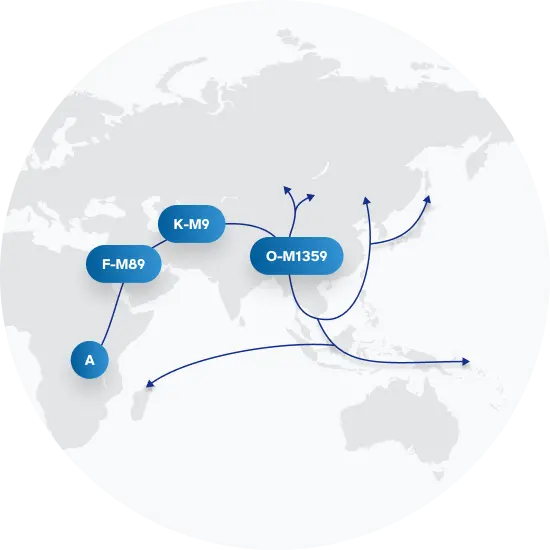Explore the Family Name Toy
How common is the last name Toy in the United States?
Based on data from the Decennial U.S. Census, the popularity of the surname 'Toy' saw subtle changes between 2000 and 2010. The rank slid down from 5567 in 2000 to 5951 in 2010, marking a decrease of 6.9%. However, the count of individuals bearing this surname slightly increased by 0.94% from 5730 to 5784 within this time period. This alteration is also reflected in the proportion per 100k, which declined by 7.55%, indicating fewer people with the surname 'Toy' relative to the overall population.
| 2000 | 2010 | Change | |
|---|---|---|---|
| Rank | #5,567 | #5,951 | -6.9% |
| Count | 5,730 | 5,784 | 0.94% |
| Proportion per 100k | 2.12 | 1.96 | -7.55% |
Race and Ethnicity of people with the last name Toy
Considering the ethnic background associated with the surname 'Toy', data from the Decennial U.S. Census indicates that it is most commonly found among those identifying as White, with a steady percentage of around 60% in both 2000 and 2010. Meanwhile, Asian/Pacific Islander identity reduced slightly by 4.08%, from 27.92% in 2000 to 26.78% in 2010. Notably, there was a significant increase of 61.57% in the Hispanic representation, albeit from a smaller base of 2.16% in 2000 to 3.49% in 2010. The presence of the surname within those who identify as Black and Two or more races remained fairly steady over the decade, while the American Indian and Alaskan Native group saw a decline of 53.85%.
| 2000 | 2010 | Change | |
|---|---|---|---|
| White | 60.44% | 60.06% | -0.63% |
| Asian/Pacific Islander | 27.92% | 26.78% | -4.08% |
| Black | 6.65% | 6.64% | -0.15% |
| Hispanic | 2.16% | 3.49% | 61.57% |
| Two or More Races | 2.57% | 2.9% | 12.84% |
| American Indian and Alaskan Native | 0.26% | 0.12% | -53.85% |
Toy ancestry composition
23andMe computes an ancestry breakdown for each customer. People may have ancestry from just one population or they may have ancestry from several populations. The most commonly-observed ancestry found in people with the surname Toy is British & Irish, which comprises 33.5% of all ancestry found in people with the surname. The next two most common ancestries are Chinese (21.0%) and French & German (19.3%). Additional ancestries include Italian, Eastern European, Chinese Dai, Vietnamese, and Spanish & Portuguese.
Ready to learn more about your ancestry? Get the most comprehensive ancestry breakdown on the market by taking our DNA test. Shop 23andMe
| ANCESTRY BREAKDOWN | COMPOSITION |
|---|---|
| British & Irish | 33.5% |
| Chinese | 21.0% |
| French & German | 19.3% |
| Other | 26.2% |

Possible origins of the surname Toy
Your DNA provides clues about where your recent ancestors may have lived. Having many distant relatives in the same location suggests that you may all share common ancestry there. Locations with many distant relatives can also be places where people have migrated recently, such as large cities. If a large number of individuals who share your surname have distant relatives in a specific area, it could indicate a connection between your surname and that location, stemming from either recent ancestral ties or migration.
Based on 23andMe data, people with last name Toy have recent ancestry locations in the United Kingdom of Great Britain and Northern Ireland and Ireland.
| RECENT ANCESTRY Location | Percentage |
|---|---|
| Greater London, United Kingdom | 65.80% |
| Glasgow City, United Kingdom | 65.80% |
| West Midlands, United Kingdom | 65.80% |
| Greater Manchester, United Kingdom | 65.80% |
| West Yorkshire, United Kingdom | 65.10% |
What Toy haplogroups can tell you
Haplogroups are genetic population groups that share a common ancestor on either your paternal or maternal line. These paternal and maternal haplogroups shed light on your genetic ancestry and help tell the story of your family.
The top paternal haplogroup of people with the surname Toy is O-F8, which is predominantly found among people with East Asian & Indigenous American ancestry. Haplogroup O-F8 is descended from haplogroup O-M1359. Other common haplogroups include R-S1855 and R-CTS241, which are predominantly found among people with European and European ancestry. Other surnames with similar common haplogroups are: Lam, Ling, Lin, Lim, Huynh, Chan, Huang, Zheng, Chen, Su.
The most common maternal haplogroups of people with Toy surname are: H1, N, H. These most commonly trace back to individuals of European ancestry.
 Paternal Haplogroup Origins O-M1359
Paternal Haplogroup Origins O-M1359
Your paternal lineage may be linked to the Han Chinese
Haplogroup O-Page23 has been found in several populations of the Han Chinese ethnic group. The ancestors of the Han, called the Huaxia, lived in the upriver basin of the Yellow River 5,000-6,000 years ago. As agricultural technology improved, the Huaxia spread east and south, and became the Han Chinese. Over the last 2,000 years, there have been three major migrations of the Han southward. The first of these migrations occurred during the Jin Dynasty from 317 to 420 CE, when nearly one million people moved south. A second migration occurred during the Tang Dynasty, after the An-Shi Rebellion, between 755 and 762 CE. The last migration occurred during the Southern Song Dynasty, from 1127 to 1297 CE, when nearly 5 million people migrated southward. The Pinghua, a branch of Han in which haplogroup O2a2b1a1 is particularly common, may be descendants of indigenous minority groups that adopted Han culture during one such major migration event.
Your maternal lineage may be linked to Marie Antoinette
Because it is so dominant in the general European population, haplogroup H also appears quite frequently in the continent's royal houses. Marie Antoinette, an Austrian Hapsburg who married into the French royal family, inherited the haplogroup from her maternal ancestors. So did Prince Philip, Duke of Edinburgh, whose recorded genealogy traces his female line to Bavaria. Scientists also discovered that famed 16th century astronomer Nicolaus Copernicus traced his maternal lineages to haplogroup H.

What do people with the surname Toy have in common?
Spoiler alert: it's complicated. People with the same last name are usually no more genetically similar than a randomly sampled group of people from the same population. That said, people with the same surname are more likely to have similar ancestries than randomly sampled individuals. The reason is the tendency of people with similar cultural or geographical backgrounds to preferentially mate with one another. That's why people who share a surname may be more likely to share traits and tendencies in common than people within the general population. Check out the percentages below to see the prevalences of tastes, habits, and traits of people with your surname compared with prevalences among 23andMe users.
Preferences
Traits
Habits
Wellness
Are health conditions linked to the last name Toy?
The short answer is that, if there is an association between surname and health, it's usually more about your ancestry than your name. Individuals with a given surname are no more genetically similar than the general population but often have similar ancestries. The populations of people associated with those shared ancestries often have sets of genetic variations, also known as alleles, in common. Some of those alleles are associated with a greater likelihood of developing certain diseases.
Disease variant frequency by ancestry
Disease allele frequencies in populations associated with the surname Toy are shown below. Important Note: not everyone with a disease allele will develop these health condition




















